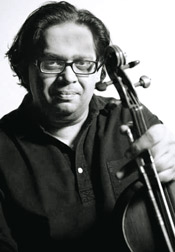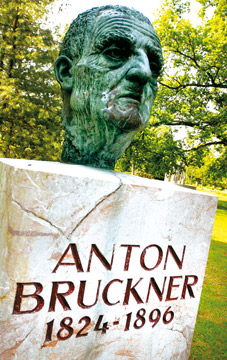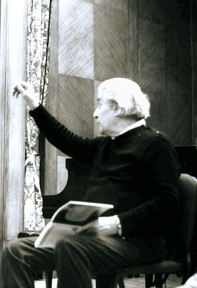Shedding light on post-modern motifs in Sri Lankan music scene
by Ranga CHANDRARATHNE
 |
|
Lakshman Joseph de Saram
pix by Kesara Ratnavibhushana |
Post- modern music signifies both musical style and musical
condition. As a musical style, post-modern music contains characteristic
of post-modern art deriving musical motifs across the spectrum of
traditions and genres. It tends to blur the traditional boundaries of
"high art" and "Kitsch". As a condition, post-modern music, in simple
terms, is a state of music after modernity. It has no particular
defining feature but often considered as mode of expression, meant for
mass consumption and also indicator of group identity or an identity of
a sub-culture.
What follows are the excerpts of an exclusive interview with Lakshman
Joseph de Saram, the film composer and Artistic Director of the Chamber
Music Society of Colombo, who responded to questions on music,
post-modernism and the National Performing Arts Theatre.
Q: There has been discussion recently in the Sinhalese and
English intellectual circuits about the post-modernistic influence in
our fine arts, and in film music your scores have been cited as a clear
example of that influence. Do you agree?
A: What is post-modern music to us anyway? Is it anti-elite,
anti-formal, blurring the lines between "high" and "low" music? If
that's what it is, maybe, the stuff I have written to date can carry
that label. I don't get too carried away with labels though.
Q: Is your music anti-elite?
A: What I meant by post-modernism having anti-elitist
proclivities was about it going bang against modernism and its exacting
academic structures. The whole 2nd Viennese School ending with (Eliot)
Carter perhaps. I suppose anyone who writes music these days that
incorporates multiple traditions and cultures and injects some form of
populist values will be labelled a post-modernist.
Q: You said blurring the lines between "high" and "low" music,
is that not in itself an elitist viewpoint?
A: Let's get off the word "elitist," my mistake - but in
essence, is not post modernism just about that? The blurring of styles?
Take Charles Ives's "Central Park in the Dark," he embeds in the score
bits of ragtime, jazz and even a (John Phillip) Sousa march. Outrageous
stuff for early 20th-century serious writing, and this brings the other
important aspect of post-modernism: irony. There is a lot of tongue in
cheek.
Q: Would you describe your music as ironic?
A: At the risk of sounding facetious, no matter where I go, I
feel tethered to this pile of unrepentant irony, I can't attribute it to
anything specific, but I deal with it. Coming back to the music, there
are tons of cheeky musical reference points and less obvious tributes,
so to speak, to my many collisions with people and incidents, music
being the common denominator in all of them. This is possible because I
have constantly engaged a mild contempt for the habitually unproven
values of let's say the structural unity and sanctity of "form" and
"tradition". I am blithely able to juxtapose a Kotahena funeral band
blowing their guts out, completely drunk, with the sound of a Grancino
cello because of this, however ridiculous it may sound.
Q: So, are you out to ridicule?
A: Well, that's never the intention, however, the music mostly
is a response to the visual or, at times, the unseen. So, if I feel the
scene requires an ironic or ridiculous sound, to prevent it from looking
overly earnest, I'll write it. There have been several instances. "Mille
Soya" and "Machan" have plenty of examples.
Q: In your opinion, who are the most important composers in
the post- modernistic era?
A: In Sri Lanka, it would be Premasiri Khemadasa, who began as
a traditionalist, went through his Stravinsky/Janacek modernistic phase
and ended up a neoconservative post-modernist, beating the label
bandwagon to death! His "Beyond Horizons," the last serious piece he
wrote while living in Prague, is a sterling example of his returning to
the principles of tradition, where he takes great pains in exorcising
his music of "style," "irony" and "shock." Re-fitting it with a moral
philosophy based on his personal idea of secular humanism with tangible
elements of his own brand of spirituality. But he was still post-modern,
because his fundamental was the blurring of multiple cultural
identities. That's primarily why he rejected the term "Mystic
minimalist."
 |
|
Anton Bruckner, post-modern romatic composer |
Other important post-modernists are John Adams; Grecki, Steve Reich,
Luciano Berio, Steve Martland, Terry Riley. you can go on. What's also
interesting is the other side of the street: the adaptation or reworking
of Western classical norms by the populists, Bjrk, the Wu Tang Clan,
Piazzolla, the Modern Jazz Quartet the effect is like having your
favourite comic book character suddenly slipping into Chaucerian
English. Nothing wrong with that.
Q: Do you think that post-modernism is unavoidable in the
context of present day Sri Lankan culture?
A: Not at all, but I can only talk about what I am involved
in. Let's take our film industry: it would be difficult to pinpoint
full-blown post-modernism in it. We are still very much based in solid
narrative structure and characterization; conventional elements still
play a big part in suspending the audience's disbelief. The directors I
work with, Prasanna (Vithanage), Boodee (Keerthisena) and Vimukthi (Jayasundara)
have experimented successfully with nonlinear storytelling with the use
of episodic and circular narratives, but if you ask them, I doubt
they'll see any "Pulp Fiction" - like ode to post-modernism in any of
their work. The influence of Parajanov, Robert Bresson, Tarkovsky, Lynch
(without the irony), weigh heavy on our top auteurs, plus they are way
too serious to be touched by post-modernism. They leave that to the guy
who does the score! I know I am going to get called on this.
Q: How about our literature?
A: I don't read.
Q: Really? Even the scripts of the films you score?
A: I have them read to me, the interesting bits! Really, I am
not an avid reader; and I have stopped reading for fun or inspiration.
The reasons are complex. Currently, if you must know, I am on two books,
re-reading Tartakower's hyper-modern chess, only because I need to
maintain an edge over my 12-year-old daughter. The other, is a mind
bending scholarly piece written by a friend of mine on the 4th movement
fragment of Bruckner's 9th. It's an obligation, and it might as well be
in Braille. Not fun.
Q: Bruckner is a composer that you have brought up frequently
in previous interviews, why?
A: Well. This is personal, but musically to me, at this point
in my life, a late Bruckner symphony represents the culmination of
everything I think music can be. A Celibidache or Furtwangler
performance of, let's say the 8th; have done things to me that no other
music has been able to. The unnerving contradictory combination of
deeply felt spiritualism, hidden in a possible web of mystic code, with
the almost demonically inspired apocalyptic eruptions, are some of the
obvious elements that make Bruckner's music overwhelming. To me, the
coda of the 8th symphony's finale is like this metaphorical altar, and
in the right hands, at the right moment, it almost demands from the
listener some sort of subconscious genuflection. It is a hugely
cathartic experience, and I am not alone in saying this. The journey has
not been easy though, starting from an early 80's performance of the 4th
conducted by my brother at Carnegie Hall; it took me decades to actually
begin to like the music. Celibidache, probably the greatest Brucknerian
in our lifetime, to make matters worse, confounding us eager students
further, said that you had to approach the score with an alchemist's
intuition. I am no closer to figuring that one out, twenty-odd years in.
Q: Will we hear the Chamber Music Society perform Bruckner in
the near future?
A: We could do his string quintet in F, but we need to find a
proper context. I would be very interested in the Chamber Music Society
programming a concert, where we present the Bruckner 3rd symphony
transcription for two pianos by Gustav Mahler, no less. 2010-2011 being
the Mahler centenary, I think it makes a lot of sense. I know the Mahler
Gesellschaft in Vienna will be interested in supporting it. Performing
the symphonies of both Bruckner and Mahler is beyond us: the resources,
and basic entry-point depth of intellect required, are gargantuan. You
need a Merlin on the podium who can guide you through those
mine-infested labyrinthine scores. Think on the lines of constructing
the vast Parakrama Samudra with a couple of pickaxes and a goat. You'll
end up hurting yourself.. It's futile.
Q: With the imminent arrival of the gleaming National
Performing Arts Theatre, the first ever purpose-built stage for acoustic
music, how do you think we should set about using it?
A: Massive question. In my department at the University of
Visual and Performing Arts, we will submit a policy paper on how we
think we can help define this magnificent building with distinctly Sri
Lankan cultural and artistic values, positioning it in a way where it
will have the potential for global appeal. That will be our primary
objective. Important secondary objectives should be any cultural
endeavour that is able to pass a basic benchmark of professionalism.
Mediocrity, amateurism, cheesy middlebrow variety "shows" should be
encouraged to perform elsewhere. Young Sri Lankans should know that they
have to aspire and excel to perform on the main stage.
It should be known to all as the pinnacle of performing excellence,
where you are sure the standards and content will always be high. Where
you won't have the elite drummers and musicians of the Temple of the
Tooth perform one day, and a school stage its earnest drama the next.
The two cannot ever share the same platform. Unacceptable. Don't get me
wrong; I'm all for kids and well-meaning dilettantes expressing their
angst and having fun on stage, but this is the National Theatre. It does
not happen at the Musikverein in Vienna, and it does not happen at the
Esplanade in Singapore. Why should it happen here? The National Theatre
should not be prostituted for money. For too long, we have tolerated
mediocrity and indiscipline in the arts, we have blurred the distinction
between passionate superficiality and basic competency making it
difficult for our young performers to know where they actually stand on
the global stage. It is up to the professional performers, the Ministry
of Culture, National Heritage, to change this.
But you and I know, cynics at heart, that this discernment in content
we talk about as a starting point for the resurgence of the performing
arts in Sri Lanka is just wishful thinking. I can just see a person walk
in with a grin and a five-lakh cheque to claim the main stage, believing
for a moment that he is contributing to the ethos of a 2500-year-old
civilization by presenting some corny drivel that would make people
cringe.
I'm not being subjective here: what we are dealing with is bad art,
using any yardstick. We have to look into ways of making the Theatre
financially viable without undermining its cultural credibility. It's
up-stream in a river of crap for the classical arts I tell you, and here
I am making waves!
But we are not giving up, just starting really. We look at Sri Lankan
cricket as an inspiration, where it was pre '96, and where it is today.
There are many more Lasith Malingas out there, and I don't just mean in
our cricketing world. We have a treasure trove of un-tapped young talent
spread out across our country, seeking and nurturing them is paramount.
Having digressed, another important angle and one of my personal btes
noires, is the subtle art of marketing culture. The people responsible
for selling the arts in this town should maybe take a look at national
performing arts complexes around the world, and know that there are
certain ground rules in play. Let's start with the basics here.
Strategies that work on a rugby field probably don't necessarily work in
a concert hall. A typical member of an audience for a chamber music
concert, is not going to be dazzled by some cheesy ad-campaign plastered
and draped all over the auditorium. Discretion and subtlety is what
works with that audience.
 |
|
Legendary maestro Sergiu Celibidache
|
Now this should not be too difficult to figure out, but we see it
happening too often. The same gaudy banners touting deals and discounts
at a 'big' match are displayed at a concert featuring a requiem for the
Buddha. The absence of fundamental refinement, style and sensitivity
when it comes to supporting "high culture" is galling. All is not lost
though; there are a few behemoth companies and formidable patrons in our
midst that understand. Hopefully, they will form the all-important
financial vanguard to Sri Lanka's modern renaissance in the arts.
Q: Do you think your opinionated stance could unfairly
alienate some people?
A: You see, Ranga, this is what I am talking about. You are
chastised for speaking out against the whole "mediocrity rules" state of
affairs. You become unpopular for not toeing the
art-as-entertainment/money-making line. I couldn't care less. The
enormous disparity between "light" and "serious", "amateur" and
"professional" is mostly felt in the Western cultural orbit, we are
morally obliged to do something about that. Our esteemed colleagues in
the Sinhalese and Tamil cultural spheres are way better organised, and
the equilibrium between the "corny" and the "sophisticated" is much more
defined and regulated.
Ultimately, all great cities are measured by their cultural pedigree,
the museums, the concert halls, the libraries, the architecture, the
content and possibly the cuisine. In our specialized niche, we will work
towards bringing a balance to the Western cultural calendar. Where
eventually, for every "musical" staged, you will have for instance, the
counter balance of the State opera. For every theatrical farce, you will
have a cerebral alternative. For every "variety show," you will have the
antidote of a classical music concert, and hopefully, you will not have
to debase these serious productions by having to throw in dinner or
short-eats as an incentive for people to attend.
So how are we going to do this? We have to think long-term, high-test
performance skills along with audience education to begin with. I belong
to a small but potent group of zealous cultural crusaders - you too -
whose mandate is unadulterated and focused. To launch this change,
top-most on our agenda is to re-connect, in spirit at least, with our
glorious past and, more tangibly, to use that consciousness as the
bedrock to build on, to further set the stage, to set new artistic
benchmarks for our future generations to exceed. The Government has
given us, with the help of the Chinese, a tremendous platform, an
instant icon; it is up to us to help define it.
Words of Wisdom
By K. Jayathilake
Translated by Indeewara Thilakarathne
Montage will carry extracts from the book 'Kudugoth
Rachana' by K. Jayathilake. Translated by Indeewara Thilakarathne
Aesthetics
Giranduru Kotte,
There is a huge meadow before me. Beyond that
is green forest line. Far above is a range of mountains covered with
light grey. Above all, there is a golden band painted on heavenly clouds
in the sky. Amidst all, there is the reflection of the sun which will
plunge and disappear at any moment. The entire world is tranquil.
I look at this stunning view through dead
branches of a tree. In order to enjoy the incomparable beauty of nature
I step outside.
Where is that phenomenal aesthetic beauty?
|

